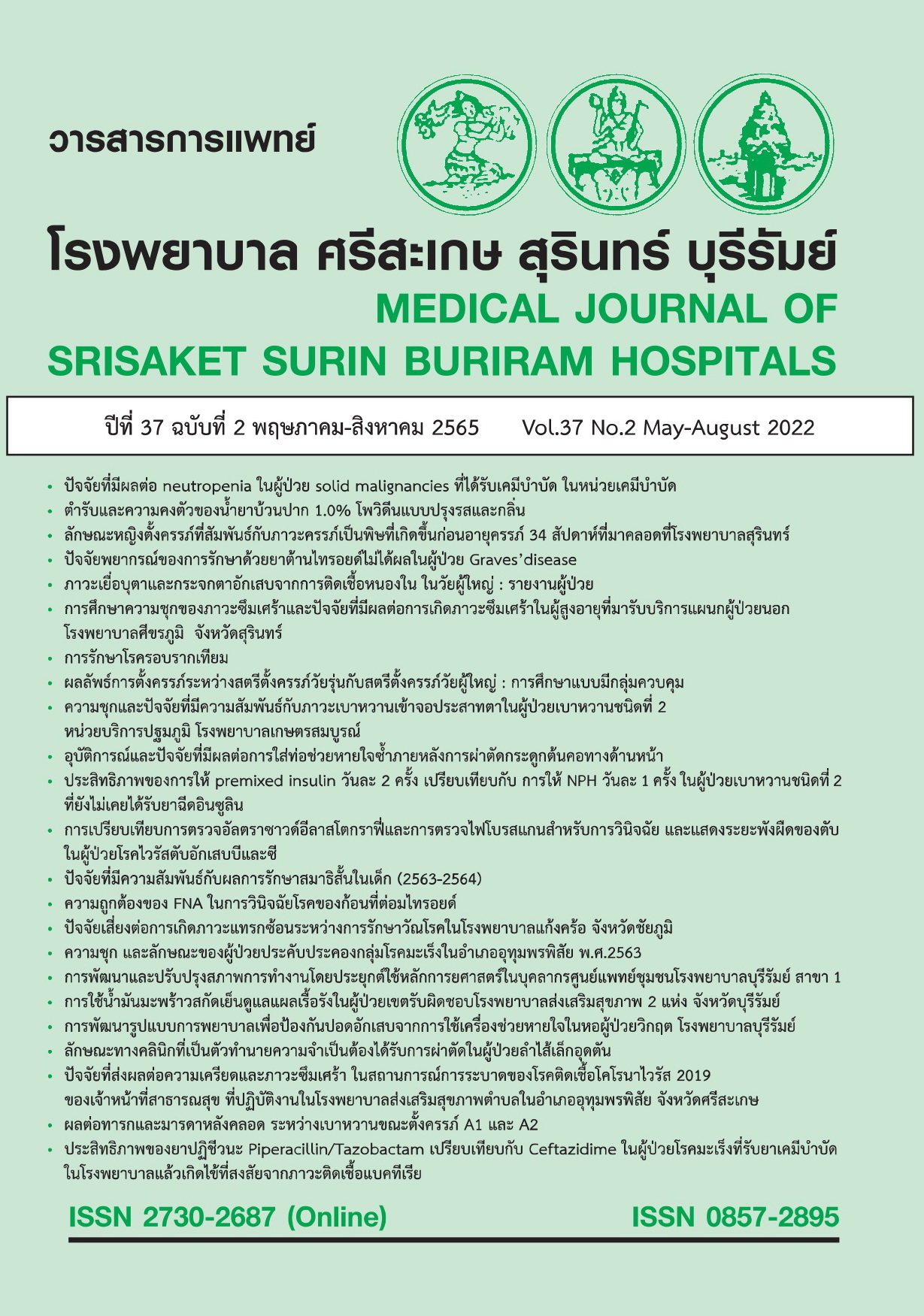ปัจจัยที่มีผลต่อ neutropenia ในผู้ป่วย solid malignancies ที่ได้รับเคมีบำบัด ในหน่วยเคมีบำบัด
Main Article Content
บทคัดย่อ
หลักการและเหตุผล: Febrile neutropenia เป็นปัญหาที่พบได้บ่อยในผู้ที่ได้รับเคมีบำบัด ใน solid malignancies และ hematologic malignancies การทราบถึงปัจจัยที่พยากรณ์การเกิด neutropenia ช่วยให้แพทย์รักษาได้อย่างเหมาะสม และลดการเกิด febrile neutropenia
วัตถุประสงค์: เพื่อศึกษาหาปัจจัยพยากรณ์การเกิด neutropenia ในผู้ป่วย solid malignancies ที่ได้รับเคมีบำบัด ในหน่วยเคมีบำบัด โรงพยาบาลบุรีรัมย์
วิธีการศึกษา: วิจัยรูปแบบ retrospective matched case-control study ในผู้ป่วย solid malignancies ที่รับเคมีบำบัดชนิดฉีดเข้าหลอดเลือดดำ หน่วยเคมีบำบัด โรงพยาบาลบุรีรัมย์ โดยทบทวนเวชระเบียนผู้ป่วย หน่วยเคมีบำบัด โรงพยาบาลบุรีรัมย์ ตั้งแต่ 1 มีนาคม พ.ศ. 2556 ถึง 30 พฤศจิกายน พ.ศ. 2564 แบ่งผู้ป่วยออกเป็นกลุ่มที่เกิด neutropenia กับกลุ่มที่ไม่เกิด neutropenia จับคู่ 1:1 ในผู้ป่วยที่ได้เคมีบำบัดชนิดเดียวกัน ในรอบเคมีบำบัด เดียวกัน และวิเคราะห์หาปัจจัยที่มีความสัมพันธ์ด้วย Multivariable binary logistic regression with cluster robusts
ผลการศึกษา: ผู้ป่วยที่ศึกษาจำนวน 407 คน แบ่งเป็นกลุ่มที่เกิด neutropenia 204 คน non-neutropenia 203 คน พบว่าปัจจัยที่พยากรณ์การเกิด neutropenia ได้อย่างมีนัยสำคัญทางสถิติ คือมีประวัติ Common Toxicity Criteria For Adverse Event (CTCAE) v4.0 (p-value < 0.021)
สรุป: ในผู้ป่วยที่เกิด ภาวะ CTCAE v4.0 ระหว่างรอบของการให้เคมีบำบัดควรพิจารณาเลื่อนเคมีบำบัดหรือลดขนาดยาเคมีบำบัดในรอบถัดไปเพื่อลดการเกิด neutropenia และ febrile neutropenia
Article Details

อนุญาตภายใต้เงื่อนไข Creative Commons Attribution-NonCommercial-NoDerivatives 4.0 International License.
เอกสารอ้างอิง
Yapici O, Gunseren F, Yapici H, Merdin A, Yaylali ÜÜ, Merdin FA. Evaluation of febrile neutropenic episodes in adult patients with solid tumors. Mol Clin Oncol 2016;4(3):379-82. doi: 10.3892/mco.2015.722.
Kuderer NM, Dale DC, Crawford J, Cosler LE, Lyman GH. Mortality, morbidity, and cost associated with febrile neutropenia in adult cancer patients. Cancer 2006;106(10):2258-66. doi: 10.1002/cncr.21847.
Pathak R, Giri S, Aryal MR, Karmacharya P, Bhatt VR, Martin MG. Mortality, length of stay, and health care costs of febrile neutropenia-related hospitalizations among patients with breast cancer in the United States. Support Care Cancer 2015;23(3):615-7. doi: 10.1007/s00520-014-2553-0.
Klastersky J, Paesmans M, Rubenstein EB, Boyer M, Elting L, Feld R, et al. The Multinational Association for Supportive Care in Cancer risk index: A multinational scoring system for identifying low-risk febrile neutropenic cancer patients. J Clin Oncol 2000;18(16):3038-51. doi: 10.1200/JCO.2000.18.16.3038.
Clark OA, Lyman G, Castro AA, Clark LG, Djulbegovic B. Colony stimulating factors for chemotherapy induced febrile neutropenia. Cochrane Database Syst Rev 2003;(3):CD003039. doi: 10.1002/14651858.CD003039.
Dulisse B, Li X, Gayle JA, Barron RL, Ernst FR, Rothman KJ, et al. A retrospective study of the clinical and economic burden during hospitalizations among cancer patients with febrile neutropenia. J Med Econ 2013;16(6):720-35. doi: 10.3111/13696998.2013.782034.
Moreira-Pinto J, Leão I, Palmela C, Branco F, Godinho J, Simões P, et al. Febrile Neutropenia in Patients with Solid Tumors Undergoing Intravenous Chemotherapy. Oncol Res Treat 2020;43(11):605-12. doi: 10.1159/000506109.
Aagaard T, Reekie J, Jørgensen M, Roen A, Daugaard G, Specht L, et al. Mortality and admission to intensive care units after febrile neutropenia in patients with cancer. Cancer Med 2020;9(9):3033-42. doi: 10.1002/cam4.2955.
Hashiguchi Y, Kasai M, Fukuda T, Ichimura T, Yasui T, Sumi T. Chemotherapy-induced neutropenia and febrile neutropenia in patients with gynecologic malignancy. Anticancer Drugs 2015;26(10):1054-60. doi: 10.1097/CAD.0000000000000279.
Crawford J, Dale DC, Lyman GH. Chemotherapy-induced neutropenia: risks, consequences, and new directions for its management. Cancer. 2004 Jan 15;100(2):228-37. doi: 10.1002/cncr.11882.
Dale DC, Crawford J, Lyman G. Chemotherapy-induced neutropenia and associated complications in randomized clinical trials: an evidence-based review [abstract 1638].Proc Am Soc Clin Oncol 2001;20:410a.
Gómez H, Hidalgo M, Casanova L, Colomer R, Pen DL, Otero J, Risk factors for treatment-related death in elderly patients with aggressive non-Hodgkin's lymphoma: results of a multivariate analysis. J Clin Oncol 1998;16(6):2065-9. doi: 10.1200/JCO.1998.16.6.2065.
Mitsuru Muto, Tatsuru Kaji, Shun Onishi, Keisuke Yano, Waka Yamada, Satoshi Ieiri. An overview of the current management of short-bowel syndrome in pediatric patients. Surgery Today 2022;52:12–21.
Grebeldinger S, Marinković S. [Short bowel syndrome--surgical aspects]. [Article in Croatian]. Med Pregl 1998;51(9-10):405-9.
Cesaire M, Le Mauff B, Rambeau A, Toutirais O, Thariat J. [Mechanisms of radiation-induced lymphopenia and therapeutic impact]. Bull Cancer 2020;107(7-8):813-22. doi: 10.1016/j.bulcan.2020.04.009.
Iorio GC, Spieler BO, Ricardi U, Dal Pra A. The Impact of Pelvic Nodal Radiotherapy on Hematologic Toxicity: A Systematic Review with Focus on Leukopenia, Lymphopenia and Future Perspectives in Prostate Cancer Treatment. Crit Rev Oncol Hematol 2021;168:103497. doi: 10.1016/j.critrevonc.2021.103497.
Flores IQ, Ershler W. Managing neutropenia in older patients with cancer receiving chemotherapy in a community setting. Clin J Oncol Nurs 2010;14(1):81-6. doi: 10.1188/10.CJON.81-86.


